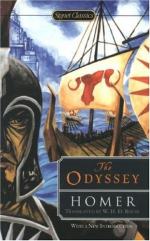“Well hast thou spoke (rejoin’d the attentive
swain):
Thy lips let fall no idle word or vain!
Nor garment shalt thou want, nor aught beside,
Meet for the wandering suppliant to provide.
But in the morning take thy clothes again,
For here one vest suffices every swain:
No change of garments to our hinds is known;
But when return’d, the good Ulysses’ son
With better hand shall grace with fit attires
His guest, and send thee where thy soul desires.”
The honest herdsman rose, as this he said,
And drew before the hearth the stranger’s bed;
The fleecy spoils of sheep, a goat’s rough hide
He spreads; and adds a mantle thick and wide;
With store to heap above him, and below,
And guard each quarter as the tempests blow.
There lay the king, and all the rest supine;
All, but the careful master of the swine:
Forth hasted he to tend his bristly care;
Well arm’d, and fenced against nocturnal air:
His weighty falchion o’er his shoulder tied:
His shaggy cloak a mountain goat supplied:
With his broad spear the dread of dogs and men,
He seeks his lodging in the rocky den.
There to the tusky herd he bends his way,
Where, screen’d from Boreas, high o’erarch’d
they lay.
BOOK XV.
Argument.
The return of telemachus.
The goddess Minerva commands Telemachus in a vision to return to Ithaca. Pisistratus and he take leave of Menelaus, and arrive at Pylos, where they part: and Telemachus sets sail, after having received on board Theoclymenus the soothsayer. The scene then changes to the cottage of Eumaeus, who entertains Ulysses with a recital of his adventures. In the meantime Telemachus arrives on the coast, and sending the vessel to the town, proceeds by himself to the lodge of Eumaeus.
Now had Minerva reach’d those ample plains,
Famed for the dance, where Menelaus reigns:
Anxious she flies to great Ulysses’ heir,
His instant voyage challenged all her care.
Beneath the royal portico display’d,
With Nestor’s son Telemachus was laid:
In sleep profound the son of Nestor lies;
Not thine, Ulysses! Care unseal’d his eyes:
Restless he grieved, with various fears oppress’d,
And all thy fortunes roll’d within his breast.
When, “O Telemachus! (the goddess said)
Too long in vain, too widely hast thou stray’d,
Thus leaving careless thy paternal right
The robbers’ prize, the prey to lawless might.
On fond pursuits neglectful while you roam,
E’en now the hand of rapine sacks the dome.
Hence to Atrides; and his leave implore
To launch thy vessel for thy natal shore;
Fly, whilst thy mother virtuous yet withstands
Her kindred’s wishes, and her sire’s commands;
Through both, Eurymachus pursues the dame,
And with the noblest gifts asserts his claim.




